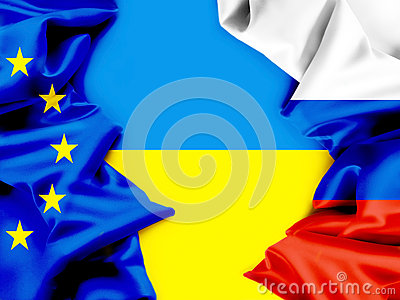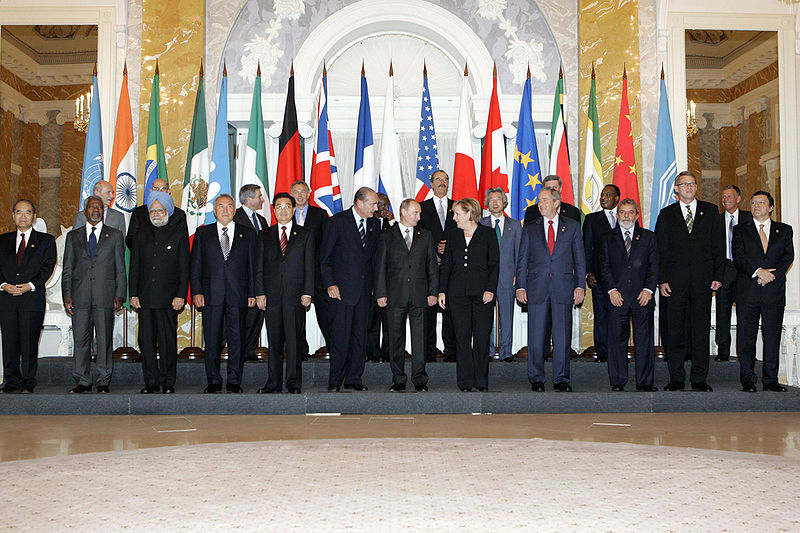 A greener Europe can Undermine an ambitious Russia. As the world watches the situation in Ukraine unfold with trepidation, the pageantry of the Olympics seems a world and a life time away (despite only being less than five hundred miles and several weeks apart). The conflict in Ukraine is playing out as a determination of spheres of influences; the EU and the United States seek to bring Ukraine into the western sphere of influence and Russia sees Ukraine as naturally being part of their influence. As such, both the EU and Russia offered Ukraine bailout deals, with the favoring of the Russian deal being the catalyst for the revolution. As of March 2nd, the crisis developing in Ukraine has led to the G-7 members pulling out of the G-8 summit, which is to take place in Sochi, in June. [1] However, some members were originally reluctant to go so far, with Canada and the U.S. leading the charge for the summit withdrawal. As of the moment that I am writing this, the US is bluntly stating that it will be moving forward with sanctions as a near certainty, while EU countries are scheduling a meeting for Thursday to consider targeted measures against Russia. [2] Where Russian resolves seems solid, Western resolves seems to be fractures by the Atlantic. What is the cause of this divide amongst G-7 and mostly NATO members? The divide is the bridge between the two spheres of influence: money and energy; the fossil fuels that Russia supplies Europe with and the desperately needed money Russia receives. This is a bridge that Europe has been seeking to dismantle and must is they want to truly counter Russian expansion of their sphere of influence.
A greener Europe can Undermine an ambitious Russia. As the world watches the situation in Ukraine unfold with trepidation, the pageantry of the Olympics seems a world and a life time away (despite only being less than five hundred miles and several weeks apart). The conflict in Ukraine is playing out as a determination of spheres of influences; the EU and the United States seek to bring Ukraine into the western sphere of influence and Russia sees Ukraine as naturally being part of their influence. As such, both the EU and Russia offered Ukraine bailout deals, with the favoring of the Russian deal being the catalyst for the revolution. As of March 2nd, the crisis developing in Ukraine has led to the G-7 members pulling out of the G-8 summit, which is to take place in Sochi, in June. [1] However, some members were originally reluctant to go so far, with Canada and the U.S. leading the charge for the summit withdrawal. As of the moment that I am writing this, the US is bluntly stating that it will be moving forward with sanctions as a near certainty, while EU countries are scheduling a meeting for Thursday to consider targeted measures against Russia. [2] Where Russian resolves seems solid, Western resolves seems to be fractures by the Atlantic. What is the cause of this divide amongst G-7 and mostly NATO members? The divide is the bridge between the two spheres of influence: money and energy; the fossil fuels that Russia supplies Europe with and the desperately needed money Russia receives. This is a bridge that Europe has been seeking to dismantle and must is they want to truly counter Russian expansion of their sphere of influence.
As it stands here are the important notes the public needs to know to move the discussion forward.
- Gazprom, which the Russian govt. has a 50.1% majority stake in, is the largest extractor of natural gas in the world. It produces over 80% of all Russian natural gas, accounting for 8% of Russian GDP in 2011.[3]
- On three separate occasions Gazprom has stopped delivery of gas over payment disputes, twice with Ukraine and once with Belarus.
- The deal deposed Pres. Yanukovich agreed to with Russia slashed natural gas prices by a third. Taken into account with the previous delivery disputes it is evident that Russia is willing to use natural to buy/demand political loyalty.
- The E.U. is the largest energy market in the world. Currently, the EU imports approximately 65% of its energy; Russia being the largest exporter to the EU, providing 22% of EU imports.[4]
- The Russian economy is slowing down; Growth, which was 5.1% in 2011, slowed to near 1% in 2013, and with projected growth remaining below 2% till 2016 at least. [5]
As Russia seeks to project itself back into prominence, while undermining democratic governments abroad, and squelching human right at home, the E.U. must, and has the ability to, sweep the rug out from under them. Europe must stand united against Russia in this and show them that gas and oil are not solid ground to stand upon. Being dependent on autocratic regimes for energy needs undermines the liberal democratic foundations of the E.U. (as well as the United States).
What we end up having is a side track of dependency theory. Dependency theory has many different definitions depending on who is speaking about it, but a general definition is that, “[Dependency is]…an historical condition which shapes a certain structure of the world economy such that it favors some countries to the detriment of others and limits the development possibilities of the subordinate economics…a situation in which the economy of a certain group of countries is conditioned by the development and expansion of another economy, to which their own is subjected.”[6] However, we now have to take it a step further. The theory originally dealt with explaining the continued poverty of developing countries and showing how a dependency on industrialized nations, who would condition their economies to only export raw materials, led to this continued poverty. Now we are dealing with the conditioning of foreign policies. Energy independence and dependence carry a great deal of weight, particularly when a large portion of your energy import demands are met by a state-owned monopoly. Fear over secure gas and oil supply fills many nations with trepidations over the thought of outright challenging and responding to Russian aggression, as previously evidenced by the divide between reactions by the U.S./Canada and E.U. To be able to safely counter Russia’s anti-democratic policies Europe can no longer be dependent on Russia for their energy needs. As such, Europe needs to meet its energy demand with internal energy production.
Europe cannot fall back on its own gas production, as it has steadily been in decline. While liquid natural gas is another option, it is not truly available in the near-term. Europe does not have a properly integrated energy market nor does it have substantial LNG import capacity. Developing both would be a costly measure, with a long implementation deadline.[7]Where then is Europe to look? To the skies and the fields and to the progress it has made in the last decade.
The 2009 Renewable Directive set binding targets for all E.U. member states: the EU will reach a 20% share of energy from renewable sources by 2020 and a 10% share of renewable energy specifically in the transport sector. By 2011 the E.U. was seeing 12.4% of its energy production come from renewable sources, with certain countries greatly outpacing the 20% target. The time has never been riper for Europe to determine a proper strategy to become more energy independent. The E.U. is already ahead of its own schedule with regards to cutting carbon emissions; the goal set in 2007 was to get carbon emissions to 20% lower than 1990 levels by 2020. As of 2011 emissions were already 17.6% lower than the levels recorded in 1990.[8] What is required for Europe to strive forward is a bold plan, led by bold leadership. However, as the financial crisis has shown, no one is willing to carry this mantle. Instead, we find a divided Europe, with Germany being the practical leader, but refusing. Therefore, the key to any continent wide green energy plan that will lead to substantial change is Germany.
Such a forum is about to take place. In late January, the European Commission presented a framework for 2030. The intention of the framework is to seize upon the success of the 2020 targets and carry that momentum forward at a greater pace. As it stands, the framework aims to cut greenhouse emissions by 40% below the 1990 level by 2030 and to increase the share of renewable energy in EU consumption to 27%.[9] However, this framework was written in the shadow of a standing down in tensions in Ukraine. The situation in Ukraine and the virtual Russian annexation of Crimea have changed the relationship between Europe and Russia. How is Europe, particularly Germany, to respond in a proper manner when, “Russia is a major supplier of oil to Germany and the Netherlands in particular ‘and of natural gas to Western Europe generally’”?[10] The framework will be up for further debate at the spring meeting of the European Council. The differences in the situation from January to March are stark. The upcoming debate, which will likely not mean legislative action till 2015, is shadowed by the debate regarding green energy subsidies taking place in Germany; the ruling coalition is seeking to curve green energy subsidies.[11] However, Europe’s recent history should give the ruling coalition pause. As the Great Recession showed, regardless of where blame may actually lie, the health of the economy can slay even the most resolute government. As such, economic growth and security has taken precedence in many ways. This is not to say foreign policy has taken a backseat, as it is hard to dislodge from the forefront in a globalized world. The question Europe needs to be asking itself is: is it wise to have your economic footing being shored up by a country that is deliberately and consistently trying to undermine your liberal-democratic values in its own country and on your doorstep? How long will they allow you to stand in defiance, before they pull the rug to get you to bend a knee?
[1] http://www.whitehouse.gov/the-press-office/2014/03/02/g-7-leaders-statement
[2] http://www.chicagotribune.com/news/chi-ukraine-russia-c risis-20140303,0,4752010.story
[3] “Gazprom in figures 2004-2008”. Gazprom. 2009. Retrieved 2009-07-02.
[4] http://www.pecob.eu/do-europe-and-russia-depend-on-each-other-for-gas-and-money-respectively
[5] http://www.bbc.com/news/business-26418664
[6] https://www.mtholyoke.edu/acad/intrel/depend.htm
[7] https://csis.org/publication/russia-eu-gas-relationship-partnership-necessity
[8] http://library.fes.de/pdfp. -files/id/ipa/10060.pdf
[9] http://ec.europa.eu/clima/policies/2030/index_en.htm
[10] http://www.cbsnews.com/news/does-russian-oil-trump-possible-european-sanctions/
[11] http://online.wsj.com/news/articles/SB10001424052702304632204579336220103661350



